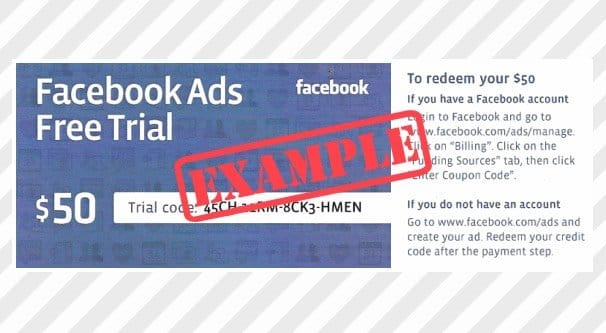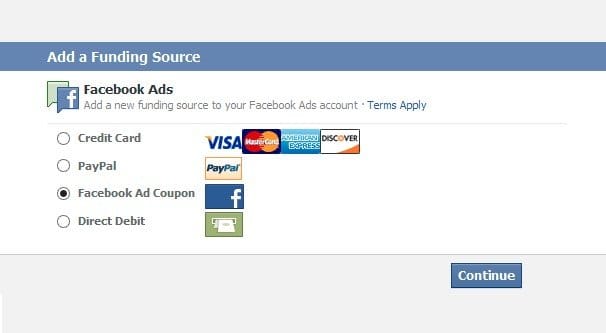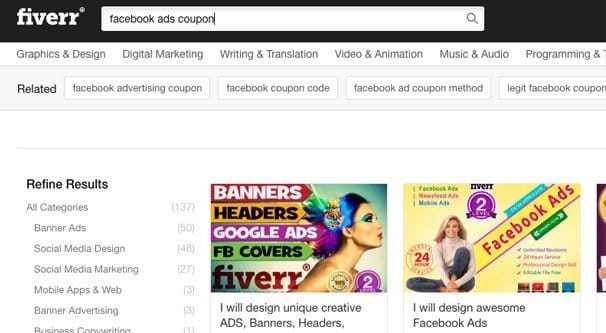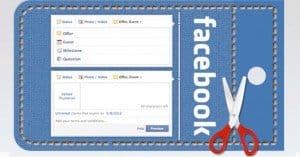 Written by ContentPowered.com
Written by ContentPowered.com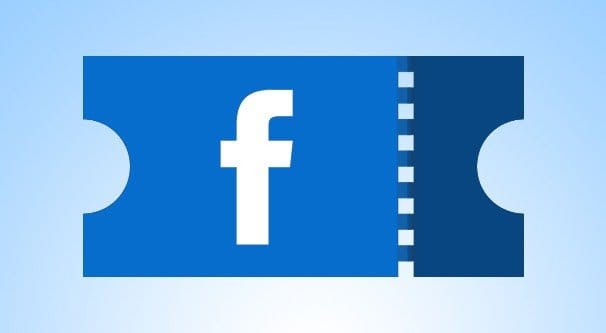
Facebook is one of the largest and most robust PPC platforms in the world, and to prove it, for a long time Facebook was handing out ad coupons and vouchers like candy. Ranging from $5 to $100, these coupons were simply free money for the person who redeemed them. It’s a typical bait method, where Facebook gives you a “free” trial and hooks you in with the power of their ads, and then you get to start paying for them.
In the last year or so, though, Facebook’s outreach has dried up. It has become harder and harder to actually find these coupon codes, and Facebook seems much less likely to hand them out in packs of a thousand like they used to. This is, largely, due to user abuse, as you might expect from any potentially free source of money.
There are still a handful of ways you can get an ad coupon, but many of them are a little on the sketchy side. It’s up to you which you want to try.
1: Facebook’s New User Boost
This is the original source of most of these coupon codes, and unfortunately for the most part it no longer exists.
The way it used to work is pretty simple. If you had a Facebook Page – not just a personal profile – you are eligible to use Facebook ads. When you sign in to the ads manager for the first time, Facebook wants to hook you. As a special offer, they would give you a code that you could redeem for $50 word of Facebook ad spend.
This $50 can go a long way! There are plenty of strategies out there where you can get a pretty good return for just $1 per day, which means a code like that would last you almost two months.
There were other ways you could get a code from Facebook as well. They used to hold contests where any participant was given a $25 code, and if they reached a specific threshold of like growth in a given time period, they would be given another. The highest grower after an audit to remove fake likes would get even more, even up to $10,000 in vouchers, though obviously you’d have to be really good to come out ahead in this scenario.
The problem, of course, is the abuse. Absolutely nothing stopped people from creating bots that would make new Facebook pages, fill them out with reasonably legitimate-looking information, open up the ads manager, and snap up the free offer code. This is how many of the third party sellers would get them; all it took was a little work, a lot of setup, and a list of viable proxies.
Pretty soon, Facebook noticed that there were a lot more vouchers being given out than there were users actually using them. In fact, most of the vouchers were being used by the same groups of users over and over. What was meant to be a new user bonus was becoming a 95% discount, when people paid a Fiverr seller $5 for a $50 voucher, instead of paying Facebook that $50. New users could still use their own vouchers, but a lot of them weren’t used by new users at all, but rather users who had been chaining vouchers to get discounts.
One way Facebook could have solved this problem would be with limited vouchers. They could have, say, made a single voucher that works for every new account exactly once. People could still abuse it by attempting to sell it, and they could create new accounts and run ads from those accounts advertising their own business, but that would be a lot easier to track and punish.
They could also have flagged each account as only able to use a voucher once in total, but then if that user happens to win a contest or get a voucher from another legitimate source – and there were other legitimate sources – they would have had to manually deal with the issue, and that puts strain on the limited amount of manpower they assign to any one task in the Facebook HQ.
In the end, Facebook’s solution was as simple as it was disappointing; they just stopped releasing more vouchers. There are some that still exist floating around out there, available from third party sellers, but it’s a crapshoot whether or not they’ll work. It’s also occasionally possible that Facebook will run a promotion giving away small vouchers, but it’s not the easy $50 everyone used to get. Those golden days are over, unfortunately.
2: Affiliate Program Offers
The second old method of getting Facebook advertising coupons was to abuse new user bonuses with companies other than Facebook themselves. For example, many web hosts, like HostGator, BlueHost, and DreamHost, all had offers where when you signed up for a hosting package, they would give you extra value in the form of advertising coupons. Facebook ad vouchers were one of the most common gifts here, and ranged from $25 to $200 depending on the company.
In fact, signing up for and cancelling accounts is how a lot of other vouchers, particularly the smaller vouchers, showed up on the marketplace. For all the same reasons as above, people would abuse anything they can to get free money. Web hosts started getting picky about how they handed out the vouchers, who got them, and who they would accept as a new user. Anyone doing the pump and dump scheme, cancelling accounts and keeping the freebies, was abusing their system and was often banned.
These days, you can look around all you want, but chances are you aren’t going to find freebies from the Facebook side of things. Oh, web hosts will still give out packs of free goodies for new users, but they won’t include Facebook vouchers. Generally, if you’re getting advertising vouchers from them at all, you’re getting AdWords vouchers and the Bing equivalent. Web hosts don’t really care about providing the fraud-target Facebook vouchers any more, and really, neither does Facebook. When Facebook stopped providing the free vouchers for new users, they also stopped providing them for web host freebies. Web hosts used up whatever stock they had, and now they’re out, so they can’t offer them.
It’s okay, though. It doesn’t save all that much money at the end of the day if you’re paying for web hosting you don’t need just to get some Facebook ads money. You would often have to be locked into a contract with either a severe cancellation fee or a price high enough to compensate for others who cut and run, so the web host still comes out ahead.
If you find a web host claiming to offer Facebook ads vouchers today, I would exercise caution. Send them a support message well before signing up for a plan, and ask them if they still offer those vouchers. Explain your concern about them no longer working, and ask what they’ll do if the voucher doesn’t work. Make sure to save the documentation in case they give you a voucher that doesn’t work. Finally, take some time to decide how much Facebook advertising is worth to you, and if the effort of signing up for web hosting you may not need is worth the minor amount of Facebook advertising cash they give you.
3: Purchasing from Resellers
The third and final way to attempt to get these Facebook ad vouchers is to get them from people who have obtained an inventory and who are now selling them. This is a risky venture, and I wouldn’t recommend it, for a number of reasons.
First of all, you have to consider who is selling these vouchers. Generally, you find these offers on black hat forums and on sites like Fiverr, particularly through the low quality sellers. Even the mid-tier sellers I’ve seen who used to sell vouchers no longer offer that service.
Do you trust the seller? This is going to be a pivotal point in the transaction. If you buy a Facebook ad voucher and it doesn’t work, are you going to have any recourse, or are you just going to have to deal with losing the $5 or $10 it cost you?
Where do you think the seller got their vouchers? If they have any left, it’s likely that they used botting methods to rack up thousands of them back when they were still available. The question you then have to ask is, how legitimate are those codes? If they were obtained using bots that are now banned, it’s possible that Facebook has deactivated the codes or is flagging them to see who tries to redeem them. You might end up part of a sting, or you might end up the one stung.
It’s also nearly impossible to actually find sellers who have an inventory any longer. The two most common places to look were Fiverr and eBay, and if you check them out today, you won’t find a single result with an actual coupon up for sale. If you see any results for coupons on either site, it’s either “we don’t sell coupons” or it’s a scam trying to make it look like you’re buying a coupon, only with a small fine print line that says the code may not be valid, no refunds.
It’s also vaguely possible you’ll find a blog post that lists some codes out in the open. You can feel free to try them, but I can pretty much guarantee they won’t work. Even if they were valid when they were posted, they were likely claimed within minutes of the publication of the article, and were one-use codes. The likelihood of you finding one and getting it to work is on par with just plugging in random letters and numbers hoping to find a voucher code that way.
A Word of Caution
Facebook has more or less decided to stop giving out free money with their ads program. I couldn’t tell you definitively why. Maybe it was too open to abuse with voucher codes. Maybe the conversion rate of people who had success within $50 and continued to spend was too low. Maybe it was all a time-limited promotion with an expiration date no one knew. Who knows! The end result is the same; Facebook is no longer providing ad coupon codes.
As a result, you have to be pretty careful with what you’re doing regarding these codes. You can be burned from both ends.
On the one side, sellers have to be looked upon with quite a bit of skepticism. You don’t know where they got their codes, or if those codes are valid and legitimate. Never sign up for something with a cancelation fee or with a lengthy contract just to get a code that might not work. Likewise, don’t pay for a code unless you trust the seller, and don’t just take the seller’s word for their validity. Look for references or reviews of the seller, and if you can’t find any or you find hints of negative reputation, consider yourself suitably warned. It’s your loss if you go ahead with the transaction and they steal your money.
On the other hand, you never know what Facebook has done with their codes. It’s possible that they’ve deactivated them all, or no longer accept any codes. It’s also possible that they’re just monitoring to see who uses them, and putting an invisible limit on it, so if you try to use two or three they’ll issue a penalty or decline them. There are any number of possible problems with redeeming the coupons with Facebook, if you can even get valid coupons in the first place.
If you do manage to find a coupon, good luck. If not, well, I’m sorry. Facebook has decided the promotion should no longer continue, and thus it no longer continues. Keep your eyes open in case they have a temporary promotion in the future.
